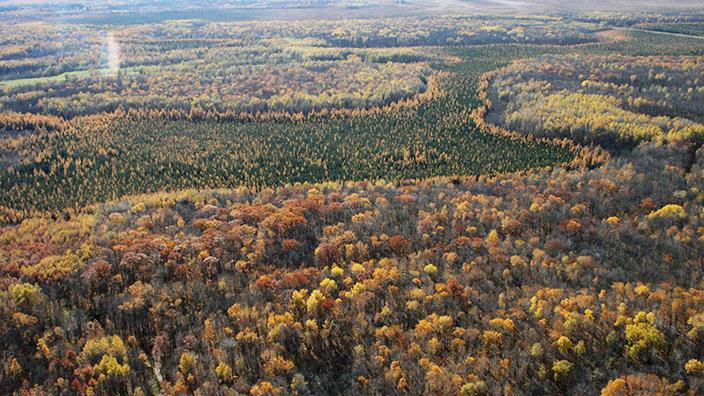Featured Research Labs

Program Overview
The ability to evaluate, measure and moderate or remediate the impacts of climate change on forests and forest ecosystem services is directly related to our ability to accurately measure, quantify and summarize forest resource data. The development of new inventory systems that combine qualitative and quantitative data acquired by remote sensing platforms and field data collections and integrated using landscape scale models is at the heart of our research to better understand how forest ecosystems have been imparied and how we can restore function to these systems.
Program Goals
- Characterize the current condition of Minnesota’s working lands
- Identify the abiotic and biotic factors responsible for changes in Minnesota’s native plant communities
- Model these changes, extrapolate potential consequences, and identify solutions to adapt to these changes, moderate their impacts, or restore forest ecosystem function
Capabilities and Expertise
- Analyze remotely sensed and field collected data, create datasets for model inputs, model data and develop and implement tests to ensure model accuracy.
- Model forest and non-forest landscape change through time and identify potential impacts of anthropogenic caused changes in ecosystems and landscapes.
- Develop data analysis and visualizations that translate and communicate findings to land managers, decision makers and the general public.
Staff
Related News

From the tree tops to boots on the ground, this avian ecologist enjoys his role in informing forest management

More than ‘just the facts,’ researchers lean into ‘acts’ and ‘pacts’ to address challenges of a changing world

Temperatures and habitat changes push species into ‘Zone of Sympatry’ with northern cousins.

NRRI cross-disciplinary research explores availability of food sources for declining species of bug-eating birds.

Expanding the reach and potential of NRRI’s fast-growing hybrid poplar trees.

DEED funding helps entrepreneur launch unique online sales platform for NRRI fast-growing hybrid tree.

Renowned Duluth avian ecologist, former NRRI leader, Jerry Niemi, co-authors The Breeding Birds of Minnesota.

Warm winter weather in northern latitudes can have both positive and negative effects on well-known and beloved resident bird species, like the Canada Jay, Boreal Chickadee and Black-capped Chickad

Early NRRI R&D went on ‘rollercoaster ride’ leading to an international effort starring Minnesota’s giving tree, the paper birch

Wildlife biologist finds NRRI research on the 'wild side' fits her life and passion.
Media Coverage
- – Whatever happened to … birch bark extracts? – Hometown Focus
- – LET IT GROW: Northland research lab creates new way to fight climate change – Northern News Now
- – NRRI’s popular Poplar InnovaTree is helping the environment – WDIO
- – A new species of tree helps remove large amounts of carbon dioxide from the atmosphere. You can only get it from a Bayfield farm – Wisconsin Public Radio
- – UMD’s fast-growing Innovatree poses solution for reforestation, environmental cleanup – KSTP-TV
- – A new fast-growing tree species out of Minnesota may be part of a climate change solution – MPR News
- – After 30 years, researchers at the University of Minnesota Duluth have created a new tree – Star Tribune
- – University of Minnesota trademarks fastest-growing poplar tree – Duluth News Tribune


